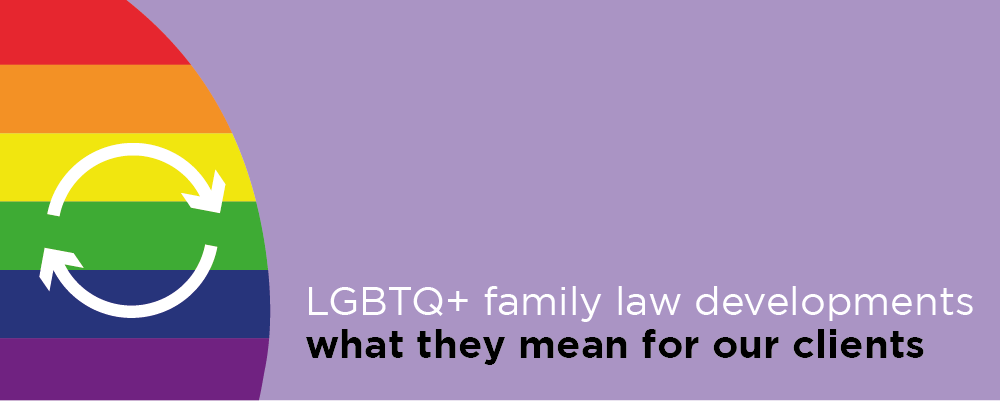- Basildon 01268244144
- Chelmsford 01245453800
- Colchester 01206217300
- London 020 4586 1280

June is Pride month and there has been much to celebrate in the LGBTQ+ community over recent years, including significant steps that have been taken in the world of family law and parental rights. So let’s take a look at some of the recent changes and legal developments in LGBTQ+ family law and what they may mean for some of our clients.
Marriage and Divorce
The Civil Partnership Act 2004 enabled same sex couples to enter into a civil partnership. Although a civil partnership provided couples with similar rights to those of married couples, it was not recognised as marriage. It was not until the Marriage (Same Sex Couples) Act 2013 was introduced that same sex couples were able to marry.
It is hard to believe that this was just 10 years ago! Nevertheless, it is without a doubt a step in the right direction and provides all couples, regardless of their gender or sexual orientation with the right to marry.
The law went a step further with the introduction of the Divorce, Dissolution and Separation Act 2022. This introduced no fault divorce which meant, for the first time, that same sex and opposite sex couples were all on a level footing so far as divorce was concerned.
The Act introduced no-fault divorce and it enables all married couples to divorce if they believe their marriage has broken down beyond repair.
Previously, under the fault-based divorce system, same sex couples were not able to rely on the fact of adultery to divorce. This has now been removed and replaced with a system that provides equality to all.
Children and Families
Adoption
In 2005, the Adoption and Children Act 2002 came into force and provided unmarried couples - including same sex couples - with the right to adopt. Before this, it was only married couples that were allowed to enter into the adoption process.
Parents
Another big change was the introduction of the Human Fertilisation and Embryology Act 2008. For the first time, this enabled female same sex couples to both be recognised as legal parents of a child conceived via donated sperm, eggs or embryos. In addition, this Act also made some changes to surrogacy law (referred to in more detail below) and permitted male same sex couples to apply for parental orders.
Surrogacy
The Surrogacy Laws have been a little slower to catch up with the developments set out above but in March 2023, the Law Commission published some reforms for the Government to improve what are very outdated surrogacy laws.
At the moment, when a child is born under a surrogacy arrangement, the surrogate (the female who carries and gives birth to the child) is always considered the child’s legal mother. This is irrespective of whether there is any genetic link. Further, if the surrogate is married or in a civil partnership when the conception takes place, the spouse or civil partner will legally be the child’s second parent. To remove this legal parentage from the surrogate and/or the spouse/civil partner, the intended parents of the child have to make an application to the Court for a parental order. This can be a lengthy and costly process for all involved but, ultimately, the decision of the Court will be based upon what is likely to be in the child’s best interests.
The proposed reforms, if implemented, will include a new regulatory regime that will offer more clarity and safeguards for the child, surrogate and the intended parents. A new system which will govern surrogacy agreements, ‘the new pathway’, is recommended and this, if correctly followed, would allow intended parents to become the child’s legal parents from birth, providing this is what is considered to be in the best interests of the child.
Gender Recognition
Under the Gender Recognition Act 2004, adults are able to legally change their gender if they meet certain criteria. In December 2022, Scottish Parliament passed a Gender Recognition Reform bill. If implemented, this would have improved the system by which transgender individuals can apply for legal recognition through a Gender Recognition Certificate.
However, the UK Government has blocked the reforms on the basis they could have an adverse impact on existing laws in the rest of the UK. For the time being, this means the existing processes, which can be long and arduous, will need to be continued to be followed.
I hope that, in the not too distant future, this will be something that can move forwards in the same way our other laws have been doing.
I am a solicitor in the Divorce and Family team in our Chelmsford office. This month our blog is focused on LGBTQ+ rights and family law updates.
If you have any questions about LGBTQ+ family law or divorce and family law in general please feel free to get in touch via Claudia.Hubert@birkettlong.co.uk. Contact me for a free 15 minute telephone conversation on 01245 453810.



Comments